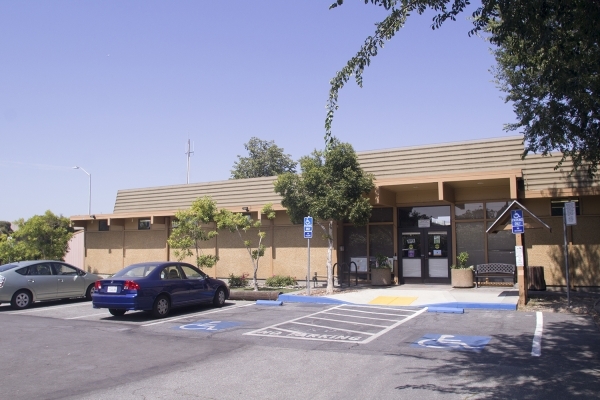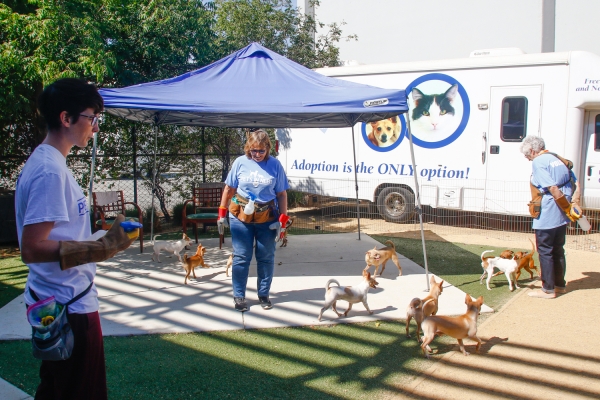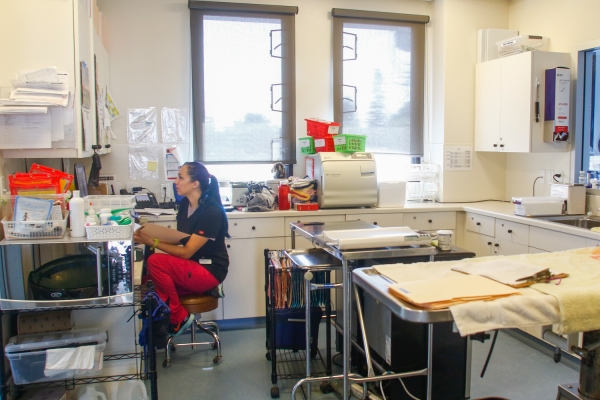• This article is part of a larger story on future of the Palo Alto animal shelter that can be found here.
For some of Palo Alto's most passionate animal lovers, the city's new partnership with Pets In Need is an exciting venture — one that could not only preserve but also improve an animal shelter that was in danger of shuttering just a few years ago.
Carole Hyde, president of the Palo Alto Humane Society, the nonprofit that operated the shelter until 1972, said last month she believes the collaboration between the city and Pets in Need could produce a "vibrant, holistic center that pulls the community and its nonprofit resources together to care for its animals. " She predicted that it would be a "great place for people and animals to go."
Scottie Zimmermann, a board member at the Friends of Palo Alto Animal Services, a grassroots group that formed in the aftermath of the city's 2012 proposal to close the shelter, likewise express optimism, telling the council on Aug. 21 there is finally a "light at the end of the tunnel."
But there is one group that isn't sold: the shelter's current employees. The management shift to Pets In Need will mean the elimination of at least four Service Employees International Union (SEIU) positions and, needless to say, the union has been opposing the city's new direction.
Last October, shortly after the city and Pets In Need first signaled their intent to move forward with a partnership, Lynn Krug, president of SEIU Local 521, urged the City Council to keep the shelter as a "community animal shelter" and suggested that the community would be better served with city workers in charge of the facility.
"We believe that one bidder makes the one bidder in control. We want to please keep the Palo Alto animal shelter within Palo Alto," she said.
In addition, the fact that SEIU workers get "background checked and fingerprinted ensures our city of Palo Alto community physical safety and document safety," Krug said. "That's not always the case with some contracts the city has."
This year, city management and the union have been going through the meet-and-confer process to discuss the potential elimination of union positions — a process that is still unfolding. Deputy City Manager Rob de Geus said the city's Human Resources staff is "working closely" with shelter staff to address their concerns, though he acknowledged that progress has been somewhat slow.
"We want to do what we can to make sure that the impacts to the staff are minimized as much as possible," de Geus said. "We do have a good track record of doing that as a city."
While the city's negotiations with the union are confidential, the SEIU's concerns about the new partnership are reflected in a list of questions that the union submitted to the city in January. These include:
• Why are you not interested in having a fundraiser for the animal shelter instead of outsourcing quality jobs?
• Why are we supplying capital investment for an outside contractor? (A reference to the city renovating the current shelter and likely building a new one.)
• Who would hold Pets in Need accountable to the taxpayers in case of wrongdoing or inability to deliver services?
In many cases, the city declined to respond to these questions due to their "subjective framing."
So far, the SEIU has largely stayed away from the public discussions of the situation; several union officials did not respond to inquiries from the Weekly for this article. Yet individual employees have not been bashful about criticizing the city's approach. Last fall, several workers added their names to a petition calling for the city to continue operating Palo Alto Animal Services.
"We do not want this vital city program to be outsourced/contracted out to 'Pets In Need' or any other organization," the petition states.
Cody McCartney, the city's lead Animal Control Officer, wrote in the petitions that Pets In Need is a "wonderful adoption agency" for cats and dogs but "not an animal shelter."
JoAnn Dixon, a veterinary technician at the shelter, likewise argued that Pets In Need does not have "shelter experience with wildlife, fractious animals, feral cats, rabbits, guinea pigs, rodents or birds of all types."
And Sachi Hwangbo, the shelter's volunteer coordinator, wrote to the council in August to express her concerns that Pets In Need might turn away animals.
She cited the council's unwillingness on Aug. 21 to insert a guarantee into the agreement that Pets In Need would not reduce intake numbers.
"Quality and capacity has never been an issue for PAAS, so it shouldn't be for PIN," Hwangbo wrote.
Sandra Pretari Hickson, an animal services specialist at the shelter, raised similar concerns last month. She observed that the new agreement calls for Pets In Need and the city to "mutually draft policies and procedures that may limit the intake of animals for the purpose of improving animal care and to operate the shelter as a 'No Kill' shelter, a fundamental principle of PIN."
That possible intake limitation flies in the face of what Hickson said shelter employees were told would happen. As a result, "animals will be abandoned, suffer and die,"she wrote.
"We have all resigned ourselves to the fact that we are being let go," she stated. "But it is not about that anymore. It is about the animals of Palo Alto, Los Altos and Los Altos Hills and the responsibility we feel for them."
The union's reluctance to support the move to Pets In Need has surprised some of the shelter's supporters. In late June, after board of Friends of Palo Alto Animal Services unanimously voted to support the city in raising funds for a new shelter, the group's vice president Jeremy Robinson emailed Assistant City Manager Ed Shikada to share the news. She also asked in the email whether there is a "hidden agenda moving the union to be so recalcitrant."
"Are they afraid of setting setting a precedent? This just can't be about keeping present jobs for a handful of people," Robinson wrote.
Shikada thanked the Friends group for its support and suggested that, as far as the union goes, "I think it's fair to say that they view their primary mission as protecting the jobs of their members."
Al Mollica, executive director of Pets In Need, disputed the notion that the nonprofit will start turning animals away — or that its takeover of the Palo Alto operation will have negatively affect wildlife. The city, he noted, currently has an arrangement to transfer any wildlife that comes into the shelter to the Peninsula Humane Society in Burlingame within a day — an arrangement that will likely remain unchanged.
And with wildlife making up about two-thirds of the roughly 1,500 animals that come into the Palo Alto shelter annually, this leaves the number of dogs and cats at about 500 — which is close to the number that the nonprofit houses at its Redwood City facility.
He also pointed to his experience as executive director of the Delaware SPCA, a position that required him to manage two shelters and to have less control over the animal population under his jurisdiction. He is no stranger to having an animal-control officer bring in 10 or 15 pitbulls that were involved in a dogfighting operation — an occurrence that he said happened once a week or so.
"I appreciate the fact that we won't have the exclusivity and ability to control our own destiny as we do in Redwood City," Mollica said.
The difference between the two shelter does not mean, however, that the quality of services in Palo Alto will go down.
"It's a great time and opportunity for the organization to move forward with an operation like this," Mollica told the Weekly. "You can never guarantee success, but we have the pieces in place to be successful."





Comments
Registered user
Midtown
on Sep 29, 2017 at 11:35 am
Registered user
on Sep 29, 2017 at 11:35 am
The devil is in the details.
"the new agreement calls for Pets In Need and the city to "mutually draft policies and procedures that may limit the intake of animals for the purpose of improving animal care and to operate the shelter as a 'No Kill' shelter, a fundamental principle of PIN."
Cynically, the only way PIN can provide cheaper services than the city, is by paying employees less and not providing the kind of benefits that Palo Alto does. Palo Alto would save far more pension liability by eliminating one $200K person than 4 low paid positions. And who needs these benefits more?
The other way PIN can save money is limiting the number of animals surrendered, to stick to their principles of a no-kill shelter. Another option is to pay high fees to surrender an animal, which only works for people who probably have other alternatives. Elderly residents moving to a care facility, lower income families having to move because they can no longer afford the rent or have been evicted, are far more likely to dump their animals than surrender them. The Stanford Cat Network will be busier than ever.
The city has been very successful in raising the funds for the new Junior Museum, without outsourcing the operations, including a major contribution to the cost. They have no problem giving $5M to Avenidas to rebuild, even as they eliminate their most popular program for low income seniors, La Comida. What does it say about our priorities that the city will pay $10M plus for a bike bridge and can't come up with the same amount for a facility that will benefit far more residents than a bike bridge? What are they thinking?
I think the city should build the new shelter, continue with the current employees and then put out an RFP to see if it would really save any money. I think the city is perfectly capable of raising the money for a new shelter from residents without help from PIN.
If saving money is the issue, then building a new building that will attract other communities to pay PA for animal services would probably save far more money than outsourcing
Duveneck/St. Francis
on Sep 29, 2017 at 4:57 pm
on Sep 29, 2017 at 4:57 pm
Tell the unions that the welfare of our pets and animals in area supercedes the ridiculous benefits union employees think they are entitled to. Palo Alto would be better off ousting all unions and supporting local work force